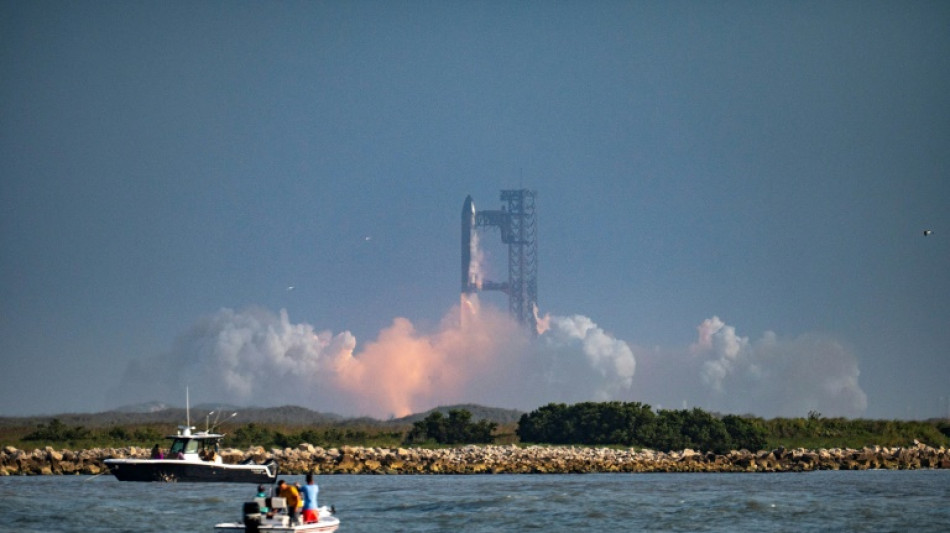
| SCS | 0.12% | 16.14 | $ | |
| CMSC | -0.55% | 23.53 | $ | |
| RBGPF | 0.12% | 82.5 | $ | |
| BCC | 4.46% | 88.895 | $ | |
| NGG | 1.49% | 87.53 | $ | |
| JRI | 0.36% | 13.167 | $ | |
| AZN | 2.06% | 188.19 | $ | |
| CMSD | -0.34% | 23.86 | $ | |
| GSK | 6.17% | 56.845 | $ | |
| RIO | -0.9% | 95.515 | $ | |
| BCE | 1.02% | 26.37 | $ | |
| RYCEF | -1.19% | 16.8 | $ | |
| BTI | -0.59% | 61.51 | $ | |
| RELX | -1.8% | 29.97 | $ | |
| BP | 0.63% | 39.065 | $ | |
| VOD | 2.18% | 15.59 | $ |

Musk's megarocket faces crucial new test after failures
Elon Musk's SpaceX is gearing up for the next test of its Starship megarocket on Sunday, after a string of recent failures that has prompted some observers to question its viability.
The world's most powerful launch vehicle is set to lift off from the company's Starbase in southern Texas at 6:30 pm local time (2330 GMT) for its tenth flight.
The mission aims to put the upper stage through a series of trials as it flies halfway around the world before splashing down in the Indian Ocean.
Unlike in recent attempts, SpaceX will not try to catch the booster stage with the launch tower's giant "chopstick" arms.
Starship is central to Musk's ambition of colonizing Mars, while NASA is counting on a modified version to serve as the Artemis lunar lander for returning Americans to the Moon.
But all three test flights so far in 2025 have ended in the upper stage exploding -- twice in fiery cascades over Caribbean islands and once after reaching space. In June, another upper stage exploded on the ground during a "static fire" test.
SpaceX's "fail fast, learn fast" ethos has long been credited with its remarkable track record, giving it a commanding global lead in launches thanks to its Falcon rocket family.
But the Starship setbacks have raised doubts over whether the company can repeat that success with the biggest and most powerful rocket in history.
- 'Lot of pressure' -
Dallas Kasaboski, a space analyst for consulting firm Analysys Mason, told AFP that the recent failures were beginning to take the sheen off SpaceX's golden reputation.
"I think there is a lot of pressure on this mission," he said. "We've had so many tests and it hasn't proven itself reliable -- the successes have not exceeded the failures."
Will Lockett, a former engineer turned commentator went further, arguing on his Substack newsletter that the lack of heavy payload tests showed "the concept of Starship is fundamentally flawed."
He added: "SpaceX is building Starships that are lighter in an attempt to increase payload to usable levels but is therefore making them much weaker than they should be" -- leading to structural failures seen during recent tests.
Headlines such as "Is Elon Musk's Starship Doomed?" in New York Magazine have amplified the scrutiny.
Musk has staked the company's future on Starship, planning to eventually retire its current generation of rockets and spacecraft in favor of the new system.
Even if the tenth test succeeds, formidable technical hurdles remain -- from making the system fully and rapidly reusable at low cost to proving it can refuel super-cooled propellant in orbit, a prerequisite for deep-space missions.
Still, SpaceX is pressing ahead, increasing the frequency of launches despite criticism from environmental groups over ecological impacts, and building new facilities in Florida, including launch and landing pads at Kennedy Space Center.
M.Chandra--MT




